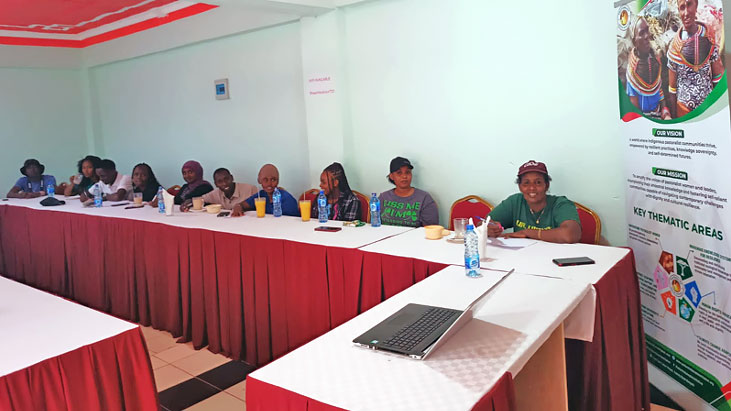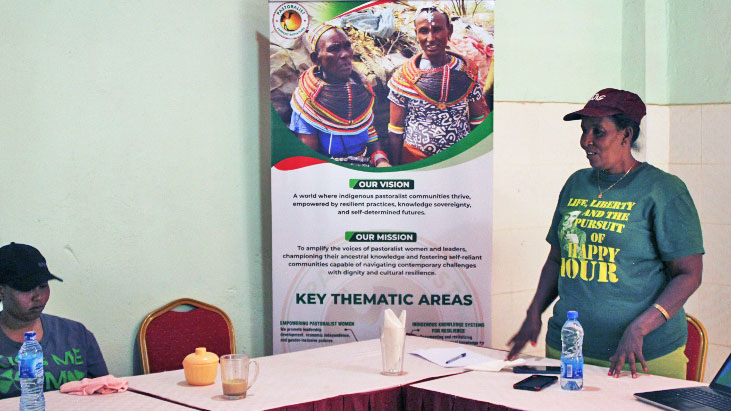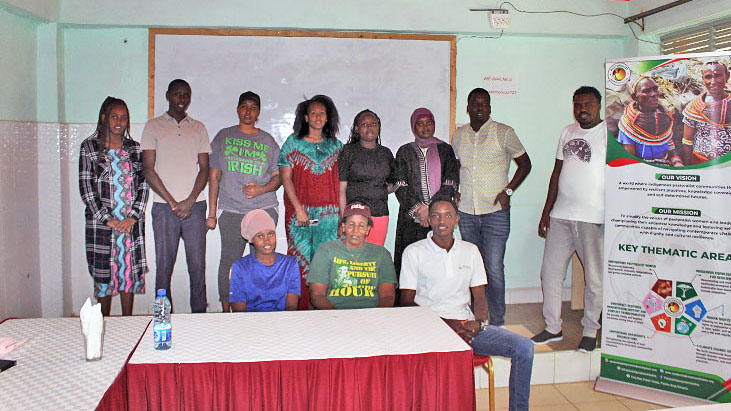The workshop titled “Empowering Young Changemakers: Utilizing Open Data and Indigenous Knowledge for Climate Action” held on March 2nd, 2024, at the Shamz Hotel boardroom was a resounding success. It provided a pivotal platform for young individuals, driven by their determination to combat the effects of climate change within the pastoralist communities. The event, organized by the Pastoralist Peoples’ Initiative in commemoration of Open Data Day 2024, was a half-day workshop that ran from 9:00 am to 02:30 PM.
The event commenced with an opening address by myself, Mr. Basele Stephen, Director of Programs and Partnerships at the Pastoralist Peoples’ Initiatives. I’m an open data expert with extensive experience in open data protocols, and I’ve been at the forefront of mapping exercises in Northern Kenya with open street maps since 2014. My presentation expounded on the core principles of open data and its potential as a potent tool in the battle against climate change.
In my address, I elaborated on the extensive collection of existing open-source data resources related to climate change and its reporting. This equipped the young changemakers with valuable tools to use in their volunteer work and empowered them with a deeper understanding of the potential impact of open data in their efforts to combat climate change.


The workshop went beyond the realm of open data by emphasizing the crucial role of indigenous communities in preserving traditional knowledge and incorporating it into climate action. Mr. Isaiah Lekesike and Margaret Super shared their invaluable insights on traditional weather forecasting methods and showcased how these time-tested practices can be seamlessly integrated with modern data analysis techniques, demonstrating the potential for young people to bridge the gap between ancestral knowledge and cutting-edge data analysis.
My address also highlighted the disproportionate impact of climate disasters on pastoralist communities, which contribute minimally to environmental pollution but bear the brunt of its consequences. This served as a call to action for the young changemakers to take on the role of climate adaptation leaders within their communities, inspiring them to become active participants in the fight against climate change.
The ensuing discussions were marked by insightful exchanges and engaging dialogues. The challenges faced by young people on the ground, such as limited internet access, scarcity of information specific to Marsabit County, and hurdles in data collection, analysis, and dissemination, were openly discussed. However, the prevailing sentiment was one of unwavering optimism.
Key Takeaways
The workshop yielded several key takeaways that are instrumental in shaping the future endeavours of the young changemakers and their impact on climate action:
- Open Data as a Powerful Tool: Understanding and utilizing open data provides young changemakers with valuable insights to address climate challenges within their communities.
- The Invaluable Nature of Indigenous Knowledge: Integrating traditional weather forecasting and other practices with modern data analysis can lead to the formulation of more effective climate action strategies.
- Collaboration is Paramount: By working together, young people can overcome the challenges of internet access, information scarcity, and data analysis, fostering a spirit of cooperation and collective action.
- Empowerment Through Knowledge: Equipping young people with the right tools and knowledge fosters a sense of agency and empowers them to become leaders in climate action within their communities.
Despite the challenges, the dedication and resilience displayed by the young minds gathered at the Hallam Restaurant Boardroom promise a brighter future for Marsabit County and beyond. The workshop served as a source of inspiration, equipping the young changemakers with the knowledge of open data and the wisdom of indigenous practices, empowering them to become catalysts for positive change in their communities.
About Open Data Day
Open Data Day (ODD) is an annual celebration of open data all over the world. Groups from many countries create local events on the day where they will use open data in their communities.
As a way to increase the representation of different cultures, since 2023 we offer the opportunity for organisations to host an Open Data Day event on the best date within a one-week period. In 2024, a total of 287 events happened all over the world between March 2nd-8th, in 60+ countries using 15 different languages.
All outputs are open for everyone to use and re-use.
In 2024, Open Data Day was also a part of the HOT OpenSummit ’23-24 initiative, a creative programme of global event collaborations that leverages experience, passion and connection to drive strong networks and collective action across the humanitarian open mapping movement
For more information, you can reach out to the Open Knowledge Foundation team by emailing opendataday@okfn.org. You can also join the Open Data Day Google Group to ask for advice or share tips and get connected with others.









